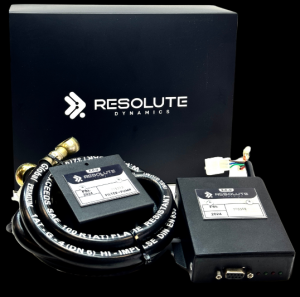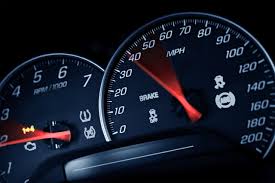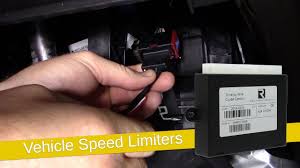Speed limiters are a technology that not many people think about, but they play a huge role in keeping us safe on the roads. These devices are built into vehicles to limit their top speed, ensuring drivers stay within safe limits.
Whether you’re a business owner managing a fleet of trucks or someone who just wants to know more, understanding how speed limiters work can give you peace of mind.
In this article, I’ll cover the most common questions people ask about speed limiters and provide answers that are easy to understand.
What Is a Speed Limiter and How Does It Work?

At its core, a speed limiter is a device that controls the maximum speed of a vehicle. It’s designed to keep the vehicle from exceeding a pre-set speed, no matter how hard you press the gas pedal.
These devices work by interacting with the engine’s electronic control unit (ECU), which governs the vehicle’s overall performance. When the vehicle reaches the speed limit, the ECU reduces fuel delivery or cuts power to the engine, preventing the vehicle from going any faster.
It’s a seamless process that doesn’t interfere with normal driving until you hit the speed cap.
Why Do Vehicles Need Speed Limiters?
Safety is the primary reason vehicles are equipped with speed limiters. High speeds increase the risk of accidents, and speed limiters help ensure that vehicles stay within safe driving limits.
For commercial vehicles, such as trucks and buses, speed limiters are essential for maintaining control, especially when transporting heavy loads. Additionally, they help businesses save on fuel costs by preventing excessive speeding, which burns more fuel.
Speed limiters also reduce wear and tear on the vehicle, extending its life and cutting down on maintenance costs.
Are Speed Limiters Mandatory?
Yes, in many countries, speed limiters are mandatory for certain types of vehicles. For example, in the European Union, all commercial vehicles over 3.5 tons are required to have speed limiters installed.
Similarly, in the U.S., speed limiters are often mandated for trucks and buses to ensure they adhere to highway safety standards. The specific rules and regulations vary from country to country, but the general goal is to improve road safety by controlling vehicle speeds.
If you’re in an industry that operates heavy vehicles, it’s likely you’ll need to comply with these laws.
Can You Disable or Override a Speed Limiter?

Technically, it’s possible to disable a speed limiter, but doing so is both illegal and dangerous. Manufacturers design speed limiters to protect both drivers and other road users, so tampering with them can lead to serious consequences.
If you’re caught bypassing a speed limiter, you could face heavy fines, void your vehicle warranty, and even lose insurance coverage. Plus, removing the speed limiter increases the risk of accidents, especially at high speeds.
If you feel like your speed limiter is set too low, it’s best to talk to a professional to see if it can be adjusted legally.
What Are the Benefits of Using a Speed Limiter?
Speed limiters offer a range of benefits that go beyond safety. By keeping speeds in check, they reduce the likelihood of accidents, which protects not only drivers but everyone on the road.
Another major benefit is fuel efficiency—vehicles traveling at controlled speeds use less fuel, which can save a lot of money in the long run, especially for businesses with large fleets.
Speed limiters also help reduce emissions, making them an eco-friendly option for companies looking to minimize their carbon footprint. And finally, speed limiters promote smoother driving, which reduces wear and tear on the engine and tires, cutting down on maintenance costs.
Do Speed Limiters Affect Vehicle Performance?
This is a common concern, but the answer is no—speed limiters do not negatively impact vehicle performance. The limiter only kicks in when you reach the pre-set maximum speed.
Up until that point, your vehicle performs normally. Acceleration, handling, and overall driving experience remain the same. For most drivers, the speed limiter will rarely be noticed, especially if the limit is set at a reasonable level.
In fact, by preventing drivers from pushing their vehicles too hard, speed limiters can actually help improve long-term vehicle performance by reducing strain on the engine.
How Can I Install a Speed Limiter in My Vehicle?
Installing a speed limiter typically requires a professional mechanic, especially if you’re dealing with newer vehicles that have complex electronic systems.
The device needs to be properly integrated with the ECU to work correctly. Most speed limiters

can be programmed to suit your specific needs, whether it’s for personal safety or meeting business regulations.
Some manufacturers even offer speed limiters as an optional feature when buying a new vehicle. While there are DIY kits available, it’s always best to have a professional handle the installation to avoid any issues with your vehicle’s warranty or functionality.
Are There Different Types of Speed Limiters?
Yes, there are several types of speed limiters available, depending on the vehicle and its purpose. The most common type is the electronic speed limiter, which is connected to the vehicle’s ECU.
There are also adjustable speed limiters, which allow the driver to set a temporary maximum speed. For heavy vehicles like trucks, there are intelligent speed assistance systems that can automatically adjust the speed based on road conditions or traffic laws.
Each type serves the same basic function but offers different levels of control and customization based on the driver’s needs.
What Maintenance Is Required for a Speed Limiter?
Speed limiters don’t require much maintenance, but it’s important to ensure that they’re functioning properly, especially if they’re used in a commercial setting.
During routine vehicle inspections, mechanics can check the speed limiter’s connection to the ECU and recalibrate it if necessary. If the limiter isn’t working as intended—like if the vehicle starts exceeding the limit—it’s crucial to have it checked right away to avoid safety risks.
Regular maintenance helps keep both the speed limiter and the vehicle in top condition.
How Much Does It Cost to Install and Maintain a Speed Limiter?
The cost of installing a speed limiter varies depending on the type of vehicle and the complexity of the device. For personal vehicles, installation can range from $100 to $300.
For commercial fleets, the cost might be higher, especially if the vehicles require more advanced systems. Maintenance costs are minimal, mostly involving occasional checks during routine inspections.
Considering the savings in fuel costs and vehicle maintenance, investing in a speed limiter can pay off in the long run.
Conclusion: Is a Speed Limiter Right for Your Vehicle?
Speed limiters are an excellent investment for anyone looking to improve road safety, save on fuel costs, and comply with regulations. Whether you’re a fleet manager or an individual driver, understanding how speed limiters work and their benefits can help you make an informed decision. If you have more questions or need professional advice, it’s always best to consult with an expert to find the right solution for your vehicle.
